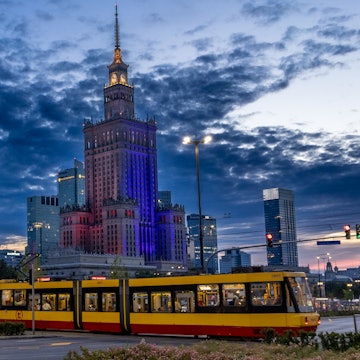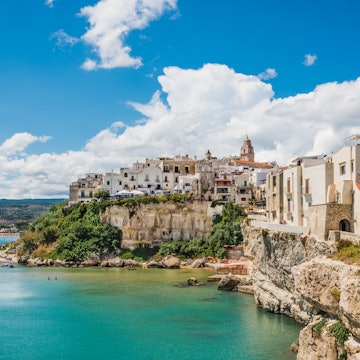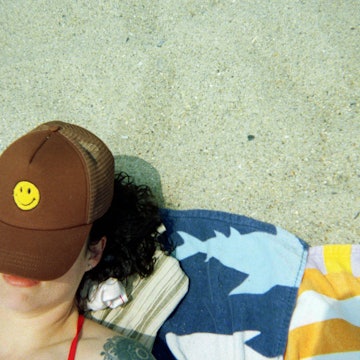
Top safety tips for attending large events during the pandemic
Oct 27, 2021 • 6 min read

Can't wait to go to a music festival? Here's what you need to know to stay safe © Ismael Quintanilla III/Shutterstock
After more than a year of pandemic restrictions and lockdown, many of us are eager to get back to the activities we enjoyed pre-pandemic, including attending large, exciting events, such as music festivals and sporting events. So how can you have your fun and stay safe during a pandemic?
Although we are still navigating the pandemic, the world has made great strides since its start in March 2020. There are currently three COVID-19 vaccines authorized in the United States, and 23 vaccines in total that have gained authorization around the world. Moreover, the scientific consensus seems to be that SARS-CoV-2, the coronavirus that causes COVID-19, is here to stay, so we must gradually learn to live with it.
How, then, can you enjoy the fun of festivals, fairs, and sports events while making sure that your risk of infection is kept at a minimum?
Two health experts, David Cutler, MD, family medicine physician at Providence Saint John’s Health Center in Santa Monica, CA, and Rob Rohatsch, MD, Chief Medical Officer at digital health company Solv Health, share their top tips.
“We are in a time now where most lockdown restrictions have ended, people are returning to many usual pre-pandemic activities, but there are still 100,000–200,000 new documented [COVID-19] cases daily in the United States causing 1,000–2,000 daily deaths,” he notes.
“So what general principles should we each be following to stay safe from [COVID-19] as we return to travel and social gathering?” Here is the advice that he and Dr. Rohatsch offer.
Get vaccinated
Dr. Cutler advises that, while people must recognize that the risk of infection will always be there in the context of travel and large social gatherings, there are, nevertheless, ways of lowering the likelihood of getting ill.
The first and most important way of reducing the risk of infection with the new coronavirus is by getting vaccinated against it. All three of the vaccines currently authorized in the United States—Pfizer, Moderna, and Johnson & Johnson—are safe and effective.
“The most important action you can take now to protect yourself and others is to get vaccinated,” Dr. Cutler emphasizes.

“Over 95% of people hospitalized with COVID-19 are not fully vaccinated,” he points out. “So when attending a large event, like a concert or sporting event, it would be important that you and others attending are vaccinated. And while there are many so-called ‘breakthrough’ infections of vaccinated people, those infections very rarely lead to serious illness.”
Being fully vaccinated against SARS-CoV-2 significantly reduces the risk of infection and, should you nevertheless contract the virus, it will reduce the risk of severe disease.
Since vaccines are often the best safety measure, Dr. Rohatsch also suggests that you should try to “attend events that have vaccine and/or testing criteria in place.”
Wear a mask
Currently, the Centers for Disease Control and Prevention (CDC) recommend that all those who are unable to receive a COVID-19 vaccine or who are only partially vaccinated should wear masks in public indoor settings, as well as in public outdoors settings in areas with a high risk of infection.
They also recommend that fully vaccinated people should continue to wear a mask in public indoor settings, so as to minimize the risk of contracting or transmitting the highly infectious Delta variant of SARS-CoV-2.
Dr. Cutler also subscribes to this preventive measure, and he also notes just how important it is to wear the mask correctly, so that it fully covers both the nose and the mouth.
Space matters
“Large events held outdoors are safer than those held indoors,” Dr. Cutler notes, so if possible, it may be better to choose events that favor outdoor spaces.
Dr. Rohatsch, too, emphasizes that outdoor spaces are generally a better bet for health than indoor spaces.

Both Dr. Cutler and Dr. Rohatsch further suggest that it is best to keep your distance from other event attendees who are not part of your own household. While the CDC recommend keeping a distance of 6 feet (2 meters) from others, Dr. Cutler notes that even keeping a shorter distance between yourself and other event-goers may help mitigate the risk.
“Whether it is 3 feet apart or 6 feet apart, the farther you stay from other people, the safer you will be,” he says.
Remember to wash and sanitize
“And don’t forget about washing your hands,” Dr. Cutler adds. “So if a large outdoor event requires vaccinations and masks, while providing for distancing and hygiene, you can feel a greater degree of safety than if any of those precautions are not in place.”
The CDC also advise washing your hands as often as possible with soap and water for at least 20 seconds, or using sanitizer with an alcohol content of at least 60% if soap and clean water are unavailable.
Do not take unnecessary risks
There is also the question of what to keep in mind before planning to attend a large event, in the first place.
Both Dr. Cutler and Dr. Rohatsch are clear on this point: do not take unnecessary risks. Before planning to travel to or attend any in-person events, they say, the first thing to look out for is the incidence of new COVID-19 cases in the area where the event is taking place.
“Attending events in states or countries with fewer [COVID-19] cases will provide some level of relative safety,” Dr. Cutler explains. In the US you can check the CDC website that offers community transmission rates. In the other countries, you can check country-specific information.
However, he also cautions that “right now, the near 100% dominance of the highly transmissible Delta variant means almost any close contact can generate the risk of [SARS-CoV-2] infection,” which is an added reason to prioritize taking all possible precautions.
“Follow local and CDC guidelines applicable to the area and event” Dr. Rohatsch urges.
‘The final consideration is you’
While these tips for staying safe and healthy will help you plan your time with more confidence, Dr. Cutler emphasizes that “[t]he final consideration before attending a large event is you.”
Specifically, the expert advises readers to beware of health risk factors—such as chronic conditions—that could make them more vulnerable to infections.
“If you are at high risk for complications from [...] COVID-19 [...] — as defined by the CDC — you’d be better off staying home until cases decrease [in the area] and/or CDC recommendations change,” Dr. Rohatsch also advises.
Although we are all excited to reclaim our pre-pandemic lives and attend in person the events that make us happy, health should always come first.
“[A]llow yourself to ‘just say no’ to gatherings with other people when you don’t feel safe,” says Dr. Cutler. “This is the new normal in the post-COVID world.”
At the end of the day, he cautions, “if you can’t reduce the risk [of infection] to a comfortable level, you [should] avoid that activity.”
For more information on COVID-19 and travel, check out Lonely Planet's Health Hub.
This article was medically reviewed by Dr. Debra Sullivan, Ph.D., MSN, R.N., CNE, COI.
You might also like:
How to manage vaccine certifications and COVID-19 passports for international travel
What is a vaccine passport and do I need one to travel?












